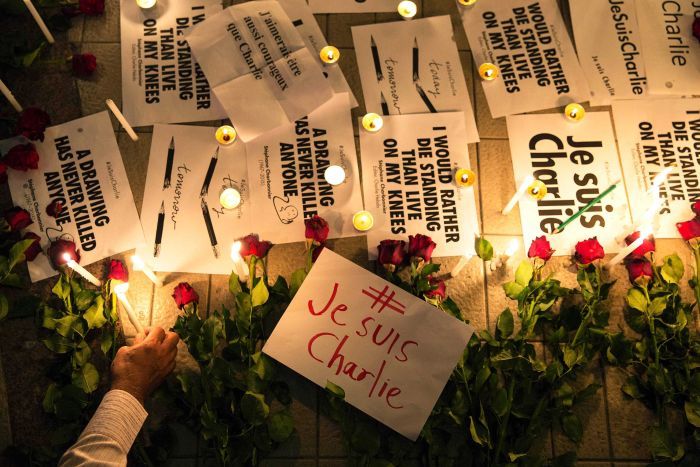
Satire can play a powerful role in society, as evidenced by the violent attack against French satirist magazine Charlie Hebdo in Paris on Wednesday. However, former editors from both Charlie Hebdo and American publication The Onion urged journalists and writers to stand up and defend themselves.
According to Lauren Effron of ABC News, Philippe Val, the former editor of Charlie Hebdo, said now was the time for everyone in the journalism profession to "find the strength and courage not to be afraid." He spoke to ABC News through a translator.
"I want people, journalists, authors, writers, intellectuals, artists, take something from what happened, from their heritage, because we are responsible for freedom in our countries," Val said. "We need courage to tell the real truth, to not deny reality, even when it is complicated."
Val added that people should be unafraid "to tell things as they are." ABC News reported that he was one of many voices in a global outpouring of condolence and outrage after gunman stormed into the Paris offices of Charlie Hebdo, killing 12 people and injuring 11 others.
Val told ABC News that he personally knew for decades two of the dead victims, cartoonists Jean Cabut and Georges Wolinski. They both worked for the publication since its inception in 1960.
"I can't accept that I will never see them again," Val said. "I worked with Cabu for a very long time. We had been friends for 40 years. He was the type of man you don't come across often in a lifetime."
The former editor admitted that the publication had faced threats before, and he even relied on police protection "for years." According to ABC News, Charlie Hebdo was firebombed in 2011 after it published a feature with a caricature of the Prophet Muhammad.
"It was like a cultural 9/11 happening in France," Val said. "It was an act of war. I am a pacifist but I am not pacific, and if there is war, I prefer Churchill to Gandhi. I think we need to win this war. I think we must not be afraid. We must be like Churchill in these affairs, as much as we can, we must continue to work and have the courage to say things even if they are dangerous."
Another former editor who reflected Val's sentiments was Joe Randazzo, who worked for The Onion for six years. He wrote an editorial on MSNBC arguing that freedom of speech will never die.
"For those who would trivialize the idea, this was what an actual attack on freedom looks like," Randazzo wrote.
Randazzo added that although The Onion "received hateful letters and emails on a semi-regular basis," he never imagined that something like the attacks in Paris would occur.
"This is radical ideology taken to an abhorrent new low," Randazzo wrote in regards to the Paris attacks. "It looks like a highly organized attack, but an attack, ultimately, on what? An idea? You cannot kill an idea by murdering innocent people - though you can nudge it toward suicide."
Randazzo argued that in a free society, satire was "an absolute necessity." He drew a comparison between the free speech culture of today and the vital role court jesters played in "repressive medieval kingdoms."
"It is, in many ways, the most powerful form of free speech because it is aimed at those in power, or those whose ideas would spread hate," Randazzo wrote. "It is the canary in the coalmine, a cultural thermometer, and it always has to push, push, push the boundaries of society to see how much it's grown."
The former Onion editor elaborated on how free speech played an important role in shaping the United States.
"In America, free speech is so important that the men who wrote our Bill of Rights put it first, but followed it up with our right to bear arms," Randazzo wrote. "But in this state of widespread social change - probably the most profound in centuries - we need to make sure that the ideal of the Second Amendment never, ever trumps the power of the First [Amendment]. That brute force never negates ideas."
Randazzo added that the gunmen involved in the Paris attacks "care for nothing" and "believe in nothing worth believing in," noting that their ideology was "worthless." However, he had some advice for all Americans in light of the tragedy.
"The most responsible thing we can do is be aware that the most likely threat to freedom will now come from within," Randazzo said. "We cannot, should not, police our own thoughts - or the thoughts of our fellow citizens. Because the First Amendment does not just protect our free speech; it protects all expression, including religion."
Randazzo also hoped that "tragedies like the one in Paris would make our ideals stronger, not weaker."
"Is that an ideal worth dying for? I think it is," Randazzo concluded. "Should anyone ever have to pay for it with blood? I pray to God not."
The Onion, Randazzo's former employer, released a satire column in the aftermath of the Paris attacks, which can be found on its website.
















